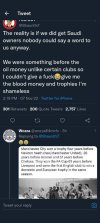FSG are gaslighting their supporters with the ‘cannot compete’ line.
Last season they were 180mins away from the unprecedented English&european quadruple (or alternatively 4 penalties away from nowt), with the ‘best’ keeper, defence, midfield and attack ever assembled, led by the ‘best’ manager, the road to continuing success was laid out and there for all to see, and it was published by reams of ‘knowledgeable’ media, and regurgitated by the most ‘demure’, ‘intelligent’ and ‘realistic’ fanbase ever.
And now, 4 months down the line, FSG present financial tenders seeking partial share selling investment with an eye to potential full and complete sale, because ‘they can’t compete’.
Bollox, the financial tenders, haven’t just magically appeared in a few months, they’ve been thought of, discussed, sought backing, proposed and finally published in a timescale far longer than between the quadruple being on (winning the LC) and now.
As Martin Samuel accurately pointed out, it’s down to the continued failure of FSG and other leech US owners of getting the English game changed into a complete US style cartel of money extraction, no relegation, guaranteed income, a complete wankfest of a league competition - FFP (hijacked at conception), project big picture, European super league … the list of attempts at cartelship is long , with big and small steps.
…and still Liverpool fans don’t see it.

